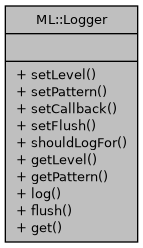The main Logging class for cuML library. More...
#include <logger.hpp>

Public Member Functions | |
| void | setLevel (int level) |
| Set the logging level. More... | |
| void | setPattern (const std::string &pattern) |
| Set the logging pattern. More... | |
| void | setCallback (void(*callback)(int lvl, const char *msg)) |
| Register a callback function to be run in place of usual log call. More... | |
| void | setFlush (void(*flush)()) |
| Register a flush function compatible with the registered callback. More... | |
| bool | shouldLogFor (int level) const |
| Tells whether messages will be logged for the given log level. More... | |
| int | getLevel () const |
| Query for the current log level. More... | |
| std::string | getPattern () const |
| Get the current logging pattern. More... | |
| void | log (int level, const char *fmt,...) |
| Main logging method. More... | |
| void | flush () |
| Flush logs by calling flush on underlying logger. More... | |
Static Public Member Functions | |
| static Logger & | get () |
| Singleton method to get the underlying logger object. More... | |
Detailed Description
The main Logging class for cuML library.
This class acts as a thin wrapper over the underlying spdlog interface. The design is done in this way in order to avoid us having to also ship spdlog header files in our installation.
- Todo:
- This currently only supports logging to stdout. Need to add support in future to add custom loggers as well [Issue #2046]
Member Function Documentation
◆ flush()
| void ML::Logger::flush | ( | ) |
Flush logs by calling flush on underlying logger.
◆ get()
|
static |
Singleton method to get the underlying logger object.
- Returns
- the singleton logger object
◆ getLevel()
| int ML::Logger::getLevel | ( | ) | const |
Query for the current log level.
- Returns
- the current log level
◆ getPattern()
|
inline |
Get the current logging pattern.
- Returns
- the pattern
◆ log()
| void ML::Logger::log | ( | int | level, |
| const char * | fmt, | ||
| ... | |||
| ) |
Main logging method.
- Parameters
-
[in] level logging level of this message [in] fmt C-like format string, followed by respective params
◆ setCallback()
| void ML::Logger::setCallback | ( | void(*)(int lvl, const char *msg) | callback | ) |
Register a callback function to be run in place of usual log call.
- Parameters
-
[in] callback the function to be run on all logged messages
◆ setFlush()
| void ML::Logger::setFlush | ( | void(*)() | flush | ) |
Register a flush function compatible with the registered callback.
- Parameters
-
[in] flush the function to use when flushing logs
◆ setLevel()
| void ML::Logger::setLevel | ( | int | level | ) |
Set the logging level.
Only messages with level equal or above this will be printed
- Parameters
-
[in] level logging level
- Note
- The log level will actually be set only if the input is within the range [CUML_LEVEL_TRACE, CUML_LEVEL_OFF]. If it is not, then it'll be ignored. See documentation of decisiontree for how this gets used
◆ setPattern()
| void ML::Logger::setPattern | ( | const std::string & | pattern | ) |
Set the logging pattern.
- Parameters
-
[in] pattern the pattern to be set. Refer this link https://github.com/gabime/spdlog/wiki/3.-Custom-formatting to know the right syntax of this pattern
◆ shouldLogFor()
| bool ML::Logger::shouldLogFor | ( | int | level | ) | const |
Tells whether messages will be logged for the given log level.
- Parameters
-
[in] level log level to be checked for
- Returns
- true if messages will be logged for this level, else false
The documentation for this class was generated from the following files:
- include/cuml/common/logger.hpp
- src/common/logger.cpp